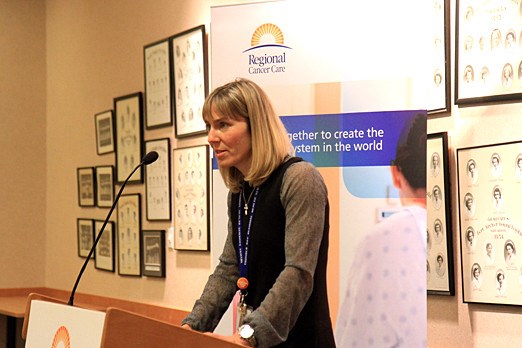Thunder Bay’s new cancer transition clinic will help free up some hands for new patients, says the director of the regional cancer care program.
The Thunder Bay Regional Cancer Care announced Wednesday the launch of a new transition clinic for colon and breast cancer patients. The clinic already started up about a month ago and received a one-time funding of $150,000 from Cancer Care Ontario.
The pilot clinic is intended to help patients who were treated for Stage 1 and 2 breast and colorectal cancer and who have a low risk of recurrence transition back to their health-care provider.
Joanne Lacourciere, director of regional cancer program, said the cancer centre usually has around 8,000 visits annual each year. Having the transition clinic will free up around 250 hours per year, which can be better utilized to help new patients, she said.
“It’s not really saving of hours but repurposing of those hours,” Lacourciere said. “Right now we’re spending 250 hours a year seeing follow up patients that could be better taken care of within the primary care setting.
“We could actually take those 250 hours and repurpose them for new patients coming in to our system who are requiring both consultation and treatment planning and ongoing support through their treatment experience.”
She added it will allow oncologists to use their expertise to new patients and gives family doctors a chance to take back their patients.
Kathy Simpson, a general practitioner of oncology, said the clinic has been going well for the first month and many patients appear to feel more prepared as they transition back to their family doctor.
She said the heart of the transition clinic is educating both the primary care provider and the patient.
Before the transition clinic, patients would spend years at the cancer centre.
Simpson said patients would sometimes feel anxious about coming back to the clinic where they started their treatment for cancer even though they were assured that they were doing well.
Although, in some cases patients grow to trust the health-care team that helped them through their treatment and it is during those times that it can be difficult to transition them back to their family doctors, she said.
“The relationship the cancer centre and the team members have with that patient is a very special relationship,” Simpson said. “Each group has invested a lot into one another.
"Patients are often very afraid to leave that protection of the cancer centre. In some circumstances, we educate patients and they still wish to continue with the cancer centre, and we acknowledge that can happen. Not all patients will be comfortable transitioning back to their family physicians.”
Michael Power, CCO’s regional vice-president for the Northwest, said they wouldn’t reapply for the funding because they only needed it to help start up the clinic. He said he hoped to one day expand the clinic from breast and colon cancer to eventually all cancers.
“Cancer is a chronic disease for the most part,” Power said.
“The vast majority of our cancer patients are seniors. As we grow the number of seniors in our community, we obviously grow the number of cancer patients. As cancer patients live with or live longer with their disease and as many more move to remission or survival, you create an ever growing demand.”
Follow Jeff Labine on Twitter @Labine_reporter
